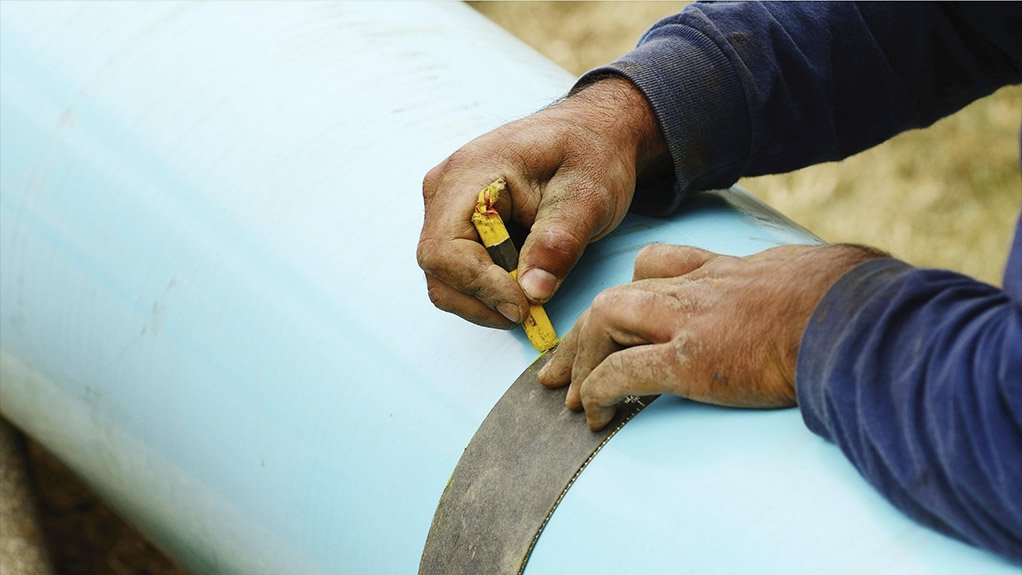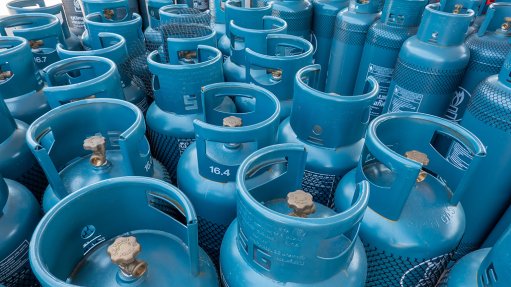When quality and safety are non-negotiable, insist on virgin material
This article has been supplied as a media statement and is not written by Creamer Media. It may be available only for a limited time on this website.
No country or modern society can exist without the conveyance of fluids (e.g. potable water, wastewater, fuel, chemicals, slurries, gas etc.) under controlled conditions and made possible thanks to the use of reliable pipes and pipelines. South Africa currently produces approximately 78 000 tonnes of PVC pipes annually – of which 72% are used in high-pressure markets and 28% in non-pressure markets. 48 000 tonnes of high-density polyethylene (HDPE) pipes are produced each year in this country, of which 84% are used in the pressure-pipes market, 4% in the non-pressure market and 12% in the telecommunications market.
“Although pipelines fulfill very important tasks, it is easy to forget about them because they are mostly hidden from view – that is until a failure occurs somewhere upstream and you end up with no water supply at your home. Before long, the sewage line is blocked, tempers flare and the inconvenience of the situation is acutely felt by everybody affected. Unfortunately, many South Africans have come to experience this scenario firsthand in recent months as water outages hit various large metros around the country, including Johannesburg, Tshwane, Ekurhuleni and Mogale City,” says Jan Venter, Chief Executive Officer of SAPPMA.
SAPPMA is a registered non-profit Association which representing more than 80 % of South Africa’s leading plastic pipe manufacturers. As the go-to organisation in the plastics pipe industry, it concerns itself with the safe delivery of the water to households, businesses and municipalities around South Africa by ensuring its members adhere to the strict manufacturing, health and safety standards that have been adopted by pipe standards bodies around the world.
“During the past two years in particular, global events such as the outbreak of the pandemic, shipping and supply chain constraints, natural and man-made disasters have all contributed to price of polymers skyrocketing to reach a thirty-year high. Owing to the fact that polymers make up more than 75% of the total cost of finished pipes, it is easy for unscrupulous operators to try and reduce costs and increase their profits by including sub-standard polymers or recycled content into the mix. SAPPMA and its members continue to push against the natural inclination to choosing the path of least resistance by maintaining our standards and the benchmarks that are stipulated in our Code of Conduct and Memorandum of Incorporation,” Venter explains.
To ensure that members meet the strict national and international product standards for HDPE and PVC pipes, they have to agree to frequent, unannounced audits which are carried out by an independent auditor. Pipe samples are selected at random and sent to accredited certification authorities for lab test labs. Only members who pass these inspections are allowed to display the SAPPMA logo on their pipes – a mark of quality which helps to preserve and promote plastic piping systems.
“In order for us to ensure unquestionable quality, a key focus area of our manifesto relates to the use of recycled content. Other than a small percentage which created in the same factory, manufacturers are prohibited from including recycled materials or regrind in their products”. Explaining the reason for taking such a tough stance at a time when virtually every other industry is pushing to include recycled content, Venter explains that plastic pipes are measured with respect to time. A good quality plastic pipe is designed and manufactured to have a minimum lifespan of 50 years (with 100 years a realistic possibility) thanks to the long-term strength of the polymer.
“The Minimum Required Strength (MRS) for plastic pipes is 50 years (or 436,000 hours) from the Creep Rupture Regression Curves for the polymer, as also specified by the International Standards Organisation (ISO). However, customers are demanding a service life of no less than 100 years for their investment in infrastructural assets. If the strength of the polymer is compromised in any way, for example, due to manufacturers using a non-conforming polymer or due to including recycled material, these requirements will not be achieved. Although inferior quality pipes might look the same at face value, non-conformance will soon become apparent – often still within the contractual maintenance period.
Another reason why SAPPMA prohibits the use of recycled content, is to protect the health and safety of the end users. Pipe manufacturers who do not belong to SAPPMA might purchase scrap plastic pipe from secondary markets without knowing where it was used previously. It might have been employed in a sewage application or exposed to chemical contamination, for example. This potential downstream risk for potable water users is a major concern for SAPPMA since no provision has been made for chemical testing of pipes and the onus for responsible manufacturing rests with the industry.
“For this reason, we are unrelenting in our efforts to communicate and educate design engineers, contractors, and all users of plastic pipe about the critical importance of getting the highest quality of polymers in the products they specify or procure. Our appeal to them is to ensure that their tender documents and subsequent contracts are perfectly clear on the fact that recycled material is not allowed at all,” Venter implores.
Producing high quality, durable plastic pipes is not a cheap exercise. It is therefore crucial to have high standards of quality in place to discourage manufacturers from taking short cuts and producing sub-standard pipes that will not be able to do the work that is expected of them, or that will have to be replaced soon after installation.
Without industry and product standards - and having a watchdog organization there to enforce these standards - chaos would erupt in the market. Thanks SAPPMA’s ongoing efforts, plastic pipes that are manufactured in South Africa and bearing the SAPPMA logo are bought and sold with confidence throughout the country. Those in the know have the confidence that the products manufactured by SAPPMA members meet or even exceed international quality standards.
Comments
Press Office
Announcements
What's On
Subscribe to improve your user experience...
Option 1 (equivalent of R125 a month):
Receive a weekly copy of Creamer Media's Engineering News & Mining Weekly magazine
(print copy for those in South Africa and e-magazine for those outside of South Africa)
Receive daily email newsletters
Access to full search results
Access archive of magazine back copies
Access to Projects in Progress
Access to ONE Research Report of your choice in PDF format
Option 2 (equivalent of R375 a month):
All benefits from Option 1
PLUS
Access to Creamer Media's Research Channel Africa for ALL Research Reports, in PDF format, on various industrial and mining sectors
including Electricity; Water; Energy Transition; Hydrogen; Roads, Rail and Ports; Coal; Gold; Platinum; Battery Metals; etc.
Already a subscriber?
Forgotten your password?
Receive weekly copy of Creamer Media's Engineering News & Mining Weekly magazine (print copy for those in South Africa and e-magazine for those outside of South Africa)
➕
Recieve daily email newsletters
➕
Access to full search results
➕
Access archive of magazine back copies
➕
Access to Projects in Progress
➕
Access to ONE Research Report of your choice in PDF format
RESEARCH CHANNEL AFRICA
R4500 (equivalent of R375 a month)
SUBSCRIBEAll benefits from Option 1
➕
Access to Creamer Media's Research Channel Africa for ALL Research Reports on various industrial and mining sectors, in PDF format, including on:
Electricity
➕
Water
➕
Energy Transition
➕
Hydrogen
➕
Roads, Rail and Ports
➕
Coal
➕
Gold
➕
Platinum
➕
Battery Metals
➕
etc.
Receive all benefits from Option 1 or Option 2 delivered to numerous people at your company
➕
Multiple User names and Passwords for simultaneous log-ins
➕
Intranet integration access to all in your organisation





















